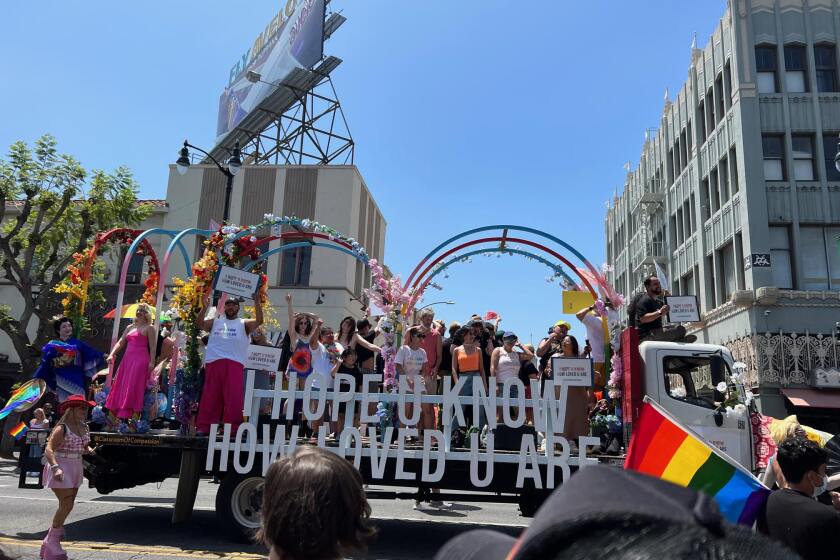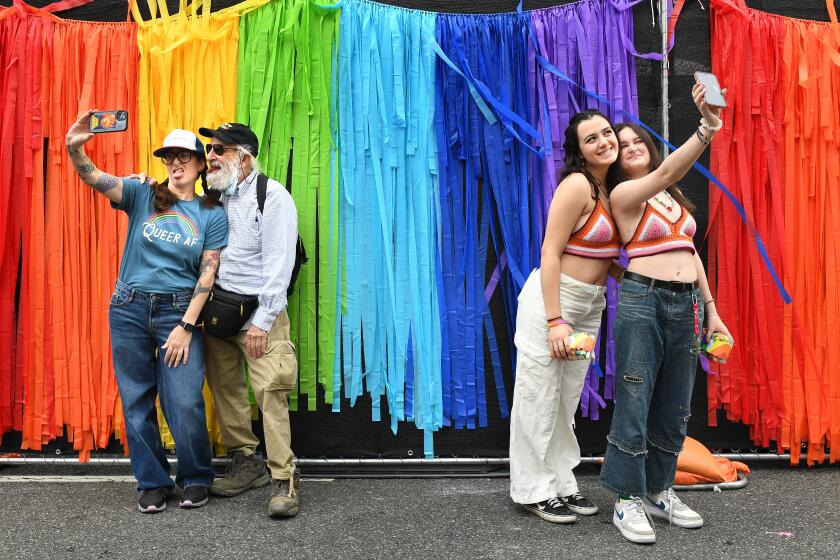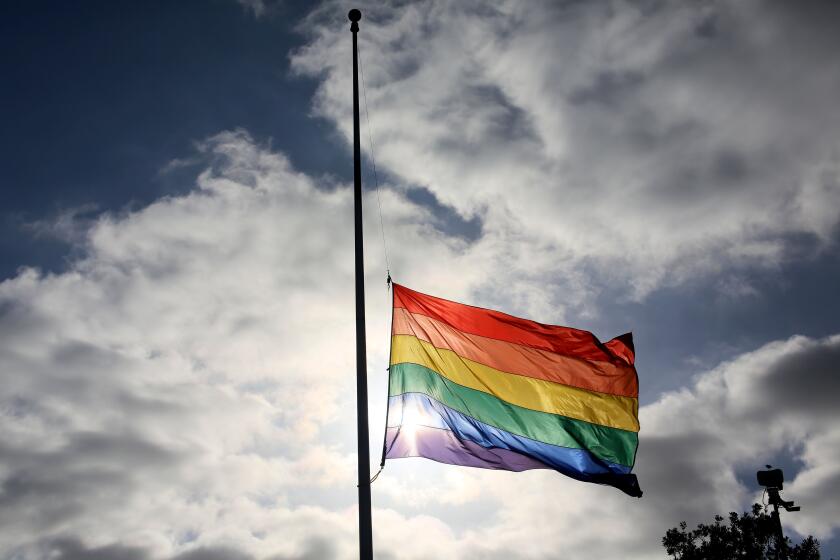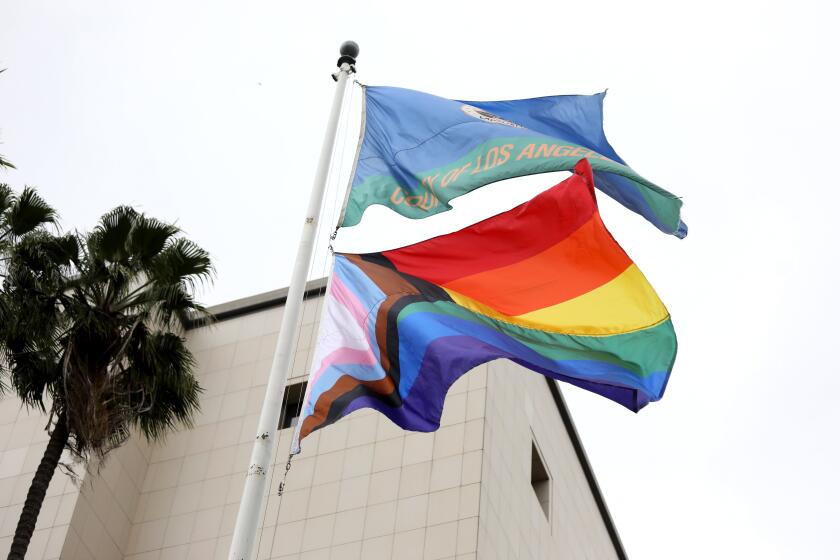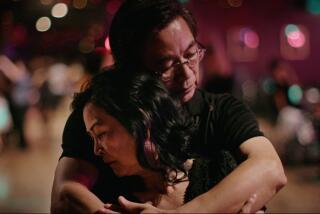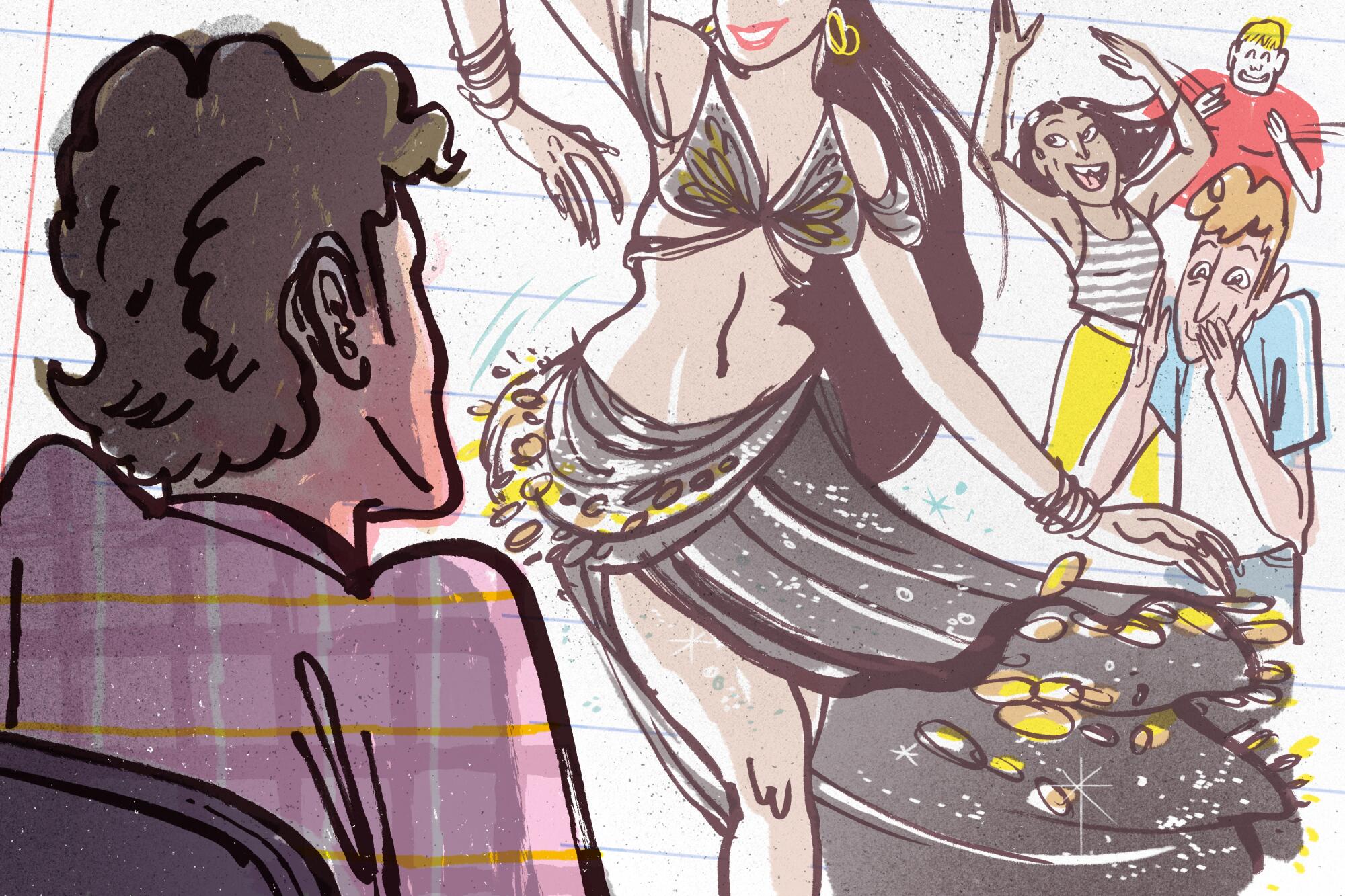
- Share via
Dear Mr. H:
Raphael Simon here — Rafi, as you may remember me.
We last saw each other in 1982 at a magnet school in Los Angeles, where I was your student.
You were a terrific teacher, Mr. H — smart, witty, occasionally tough, with a genuine enthusiasm for the subjects you taught. But I am not writing to thank you for what I learned in your class; this isn’t one of those letters. Nor am I writing to accuse you of anything; this isn’t one of those letters either.
I am writing to apologize.
Like most apologies, this one is purely performative. It changes nothing. Nonetheless, I feel compelled to confess.
The belly dancer? My bad.
Diana Goetsch spent months visiting red-state libraries to do presentations on the freedom to read. Would she be recognized, or clocked as transgender?
I found her. I hired her. I was responsible for the whole thing, except the belly dancing itself.
You do remember the belly dancer, don’t you? Let me back up.
When I was in ninth grade, I took your hybrid history and English class called Research Writing, in which we learned such things as how to use card catalogs, document sources and format footnotes — once-vital skills now lost to time and ChatGPT.
For my first paper, I chose to write about the Black Hole of Calcutta, only to discover that the name had nothing to do with astronomical black holes, much less the all-nude musical “Oh! Calcutta!” For my historical fiction project, I wrote a mystery story about Napoleon’s exile on Elba — a subject I picked mainly because Napoleons were a type of pastry I loved.
Essential California newsletter writer Justin Ray explains how his homosexuality has created friction in his relationship with his parents.
To state the obvious, nothing we covered in your class justified having a half-naked woman dance around our desks.
You were in your 30s. Slim, fair-skinned, wavy brown hair. Casually preppy.
I was 14, pimply, bookish. A typical if slightly effeminate adolescent Jewish boy, California version. I was also, at the time, just beginning to suspect something about myself, or just beginning to begin to suspect.
In any case, I liked you. All your students liked you. Research Writing was an honors class. We sat in a circle rather than in rows. Naturally, we wanted to celebrate your birthday. A birthday surprise — that was the pretext I sold my classmates on.
Why a belly dancer and not, say, a birthday cake?
The boycotts directed at Bud Light, Target and the Dodgers prove that anti-LGBTQ+ stigma is evaporating.
For one thing, belly dancing played a larger role in my imagination than you might expect. This was mostly due to my grandmother Esther, who had an enduring fascination with belly dancers. She would describe the way they moved their tummies as if by magic with muscles unknown to the rest of us. A powerful female force, sexy and not subservient.
I first saw live belly dancers at my favorite restaurant, Moun of Tunis, on Sunset, where diners sat on low banquettes and ate off brass tables. At hourly intervals, music would start to play and women in their sequins and silks would emerge from behind a curtain to shimmy and shake their way across the room — heaven.
It was from Moun of Tunis that I got the name of your dancer. Funny to think what a difficult task that must have been. I would have had to consult the Yellow Pages, or more likely, call Information — something my parents frowned upon because of the toll. When I phoned the restaurant, I would have had to speak to a live human and explain what I wanted. All this before cold-calling a belly dancer.
Pride event started to honor Stonewall. In a year of vicious backlash, an expert reflects on what it means to celebrate Pride in 2023.
On your birthday, I remember being nervous, uncertain that she would come. I jumped up when I heard the knock on the door.
Our classroom was in a bungalow, and she was standing on the stoop, dyed black hair, bright red lipstick, a trench coat covering her costume and a boombox under her arm.
I’d been so excited; now, too late, I was overcome by doubt. I ushered her into the room. My classmates giggled. I pointed to you. “There’s the birthday boy.”
Without a word, she put on her music, unbuttoned her coat and began to whirl.
A beloved pastor in Alabama killed himself after photos were published online showing him in women’s clothing. The sad story is all too familiar.
The dance is hazy in my mind, a blur of translucent black veils and long silvery scarves.
She circled the room, then circled you, then the room again — sexy but never too sexy.
While the rest of the class hooted and hollered, I watched your expressions. Your face paled, then reddened, then paled again. It showed a flash, but no more than a flash, of anger, and intense embarrassment, and eventually, polite patience and forced good humor.
Of course, it was precisely to read your reactions that I’d arranged the surprise. And that’s the real reason for this apology.
Your possible gayness had been a subject of debate among your students, not in a malicious way, more in a fun if gossipy way. Then a month or two before your birthday, you came close to speaking our speculations aloud.
I don’t remember the context. Perhaps we were talking about Anita Bryant or some other anti-gay crusader. Or, closer to home, the Briggs Initiative, which had almost succeeded in banning gays and lesbians from teaching in California a few years earlier.
Kanan Durham never wanted to be an activist. But the trans Orange County’s man and other LGBTQ+ people in Orange County feel called to speak out against a climate of hostility in Huntington Beach.
I only remember the phrase you used at one point: “my gay friends and my straight friends.” As though they were equal categories. As though friends — anyone — might as easily be gay as straight.
As though you, our teacher, might be.
In 1982, the idea of an openly gay teacher was controversial in a way that is hard to fathom in California today — or in parts of California today. (The attempt to ban LGBTQ+ books and squelch LGBTQ+ speech has recently spread to such nearby locales as Glendale and Huntington Beach.) For you to suggest you might be gay, however ambiguously, must have taken tremendous courage.
And I rewarded your courage by bullying you, with a belly dancer.
A test, I’d called it, when I pitched the idea to my classmates. What was I expecting? Were you supposed to pant like a horny cartoon character if you were straight? And if you were gay, what then? Turn green?
Downey’s City Council voted 3 to 2 to approve a neutral flag policy in the city, reversing a previous policy that allowed for the flying of other flags, including the LGBTQ+ Pride flag.
Whether or not the word “test” entered your mind, judging from your reactions, you sensed that your sexuality was being challenged. I am so sorry. The premise of the stunt was as offensive as it was absurd.
I wasn’t brave enough to claim credit, but I suspect that you suspected. In my memory, a knowing look or two passed between us. Perhaps you understood what I did not: that in testing you for signs of homosexuality, I was trying to inoculate myself against the same condition.
When the belly dancer finished dancing, you applauded, very much as if you’d enjoyed yourself. You thanked us for your birthday surprise, even though we all knew it had been more birthday prank than birthday present.
So I guess this is a thank-you letter, after all. Thank you for being more forgiving than furious. Thank you for not interrogating too closely who hired the belly dancer, or why.
And most of all, thank you for instilling in your students the idea that gay might be OK, even if it would take this gay student several more years to absorb that simple lesson.
Sincerely, Rafi
Raphael Simon is better known as children’s author Pseudonymous Bosch. He and his husband live in Pasadena with their two daughters. Mr. H, as it turns out, does remember the belly dancer. He and his husband just celebrated 30 years together.
More to Read
A cure for the common opinion
Get thought-provoking perspectives with our weekly newsletter.
You may occasionally receive promotional content from the Los Angeles Times.

